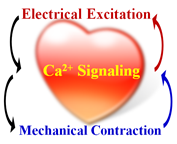Our Vision
In few specialties of medicine are new promising drugs shown to be so much inferior to placebo and even worse, to increase mortality.
–Sanderson, Editorial on SWORD and CAST trials
Why heart diseases remain the #1 killer without effective drug therapy?
Why heart diseases remain the #1 killer without effective drug therapy?
The heart is a dynamic organ; the cardiomyocytes excitation-contraction is controlled by three dynamic systems — the electrical, the Ca2+ signalling, and the contractile system. Previous research and drug development often targeted a single molecule in a single system. However, because of the feedback interactions between these non-linear dynamic systems, a change in one system can engender unexpected changes in all systems, making the drug effect to be unpredictable. We envision that development of effective anti-arrhythmic drug therapies requires a paradigmatic shift from targeting a single molecule or a single system to a new strategy that embraces the integrated behaviour of all dynamical systems that control cardiac function and heart diseases.
However, because of the feedback interactions between these non-linear dynamic systems, a change in one system can engender unexpected changes in all systems, making the drug effect to be unpredictable. We envision that development of effective anti-arrhythmic drug therapies requires a paradigmatic shift from targeting a single molecule or a single system to a new strategy that embraces the integrated behaviour of all dynamical systems that control cardiac function and heart diseases.
Our interdisciplinary team combines molecular and cellular biology, chemistry, physics, and mathematical modelling to advance research in three areas.
Why heart diseases remain the #1 killer without effective drug therapy?
The heart is a dynamic organ; the cardiomyocytes excitation-contraction is controlled by three dynamic systems — the electrical, the Ca2+ signalling, and the contractile system. Previous research and drug development often targeted a single molecule in a single system.
 However, because of the feedback interactions between these non-linear dynamic systems, a change in one system can engender unexpected changes in all systems, making the drug effect to be unpredictable. We envision that development of effective anti-arrhythmic drug therapies requires a paradigmatic shift from targeting a single molecule or a single system to a new strategy that embraces the integrated behaviour of all dynamical systems that control cardiac function and heart diseases.
However, because of the feedback interactions between these non-linear dynamic systems, a change in one system can engender unexpected changes in all systems, making the drug effect to be unpredictable. We envision that development of effective anti-arrhythmic drug therapies requires a paradigmatic shift from targeting a single molecule or a single system to a new strategy that embraces the integrated behaviour of all dynamical systems that control cardiac function and heart diseases.Our interdisciplinary team combines molecular and cellular biology, chemistry, physics, and mathematical modelling to advance research in three areas.
- Development of innovative technologies to enable experimental studies of the feedback interactions between the dynamic systems in live cardiomyocytes.
- Study of the mechano-chemo-electro-transduction mechanisms at molecular and cellular levels that control heart function in health and diseases.
- Many seemingly distinct heart diseases (such as those listed below) increase the risk of cardiac arrhythmias. We hypothesize that a common thread linking these arrhythmias is abnormal mechano-chemo-electro-transduction. Testing this hypothesis may provide a unified explanation for arrhythmias in seemingly distinct diseases and provide novel strategies for combating arrhythmias.
- hypertension induced arrhythmias and heart failure
- Muscular Dystrophy Cardiomyopathy
- Hypertrophic cardiomyopathy
- Dilated cardiomyopathy
